The IIT Ropar Technology and Innovation Foundation (iHub – AWaDH) commemorated its 4th Foundation Day with a Farmer Engagement Session, emphasizing its mission to bridge the gap between cutting-edge research and grassroots agricultural practices. Established by the Department of Science & Technology (DST) under the National Mission on Interdisciplinary Cyber-Physical Systems (NM-ICPS), AWaDH has emerged as a leader in developing solutions for agricultural and environmental sustainability.
With ₹110 crores in funding from DST and an additional ₹5 crores from Startup India, AWaDH has:
Developed over 70 innovative technologies in agriculture and water sustainability.
Nurtured 100+ agritech and water tech startups.
Trained 5,000 youth in cyber-physical systems, focusing on AI and IoT applications.
Established CPS Labs nationwide to promote the adoption of emerging technology platforms tailored for agriculture and water management.
Connecting Farmers with Technology
The Farmer Engagement Session, held in collaboration with the Department of Horticulture, Punjab Government, brought together 50+ farmers, alongside representatives from NGOs, Farmer Producer Organizations (FPOs), Farmer Producer Companies (FPCs), and agricultural organizations. This initiative aimed to foster dialogue, ensuring innovations are attuned to the challenges and needs of farming communities.
Participants, including practitioners of natural farming, vermicomposting, poultry farming, and medicinal agriculture, shared their experiences and challenges. This exchange of knowledge between IIT Ropar researchers and farmers was designed to ensure technology adoption at the grassroots level.
Key Innovations Showcased
AWaDH presented several impactful technologies during the event:
Mooh Sense (Cow Health Monitoring System):
An AI-powered livestock management tool that tracks animal behavior, movement, and temperature.
Provides real-time insights via mobile applications, benefiting farmers across Punjab, including deployments at GADVASU in Ludhiana, with NABARD support.
Nano Bubble Technology:
Treats water using electrochemically active nano bubbles to degrade organic matter, eliminate pathogens, and oxidize harmful chemicals.
Widely applied in ponds and reservoirs across Punjab.
Soil Health Monitoring System:
Utilizes sensors and lab analysis to evaluate soil quality and optimize crop management.
Weather Monitoring System:
Assists farmers in making informed decisions based on real-time weather data.
Bee Sense Technology:
A novel solution to monitor and enhance pollination processes, increasing agricultural productivity.
Collaborative Engagement and Felicitations
The session featured a welcome address by Dr. Radhika Trikha, CEO of IIT Ropar TIF AWaDH, and remarks from the Horticulture Department Officer of Rupnagar. A moderated discussion led by Mr. Mandeep Singh Badwal allowed farmers to voice their challenges and explore solutions with AWaDH experts.
Presentations by Dr. Prabir Sarkar, Domain Coordinator, and Mr. Desh Raj, Project Manager, highlighted the innovations developed by AWaDH. Live demonstrations at the CPS Labs showcased these technologies in action.
The event concluded with a felicitation ceremony honoring participating farmers, NGOs, and organizations, recognizing their vital role in driving innovation and sustainability.
Commitment to Sustainability
AWaDH reaffirmed its dedication to creating practical, sustainable, and impactful technologies that empower marginalized farming communities. By addressing the unique needs of farmers and fostering partnerships with stakeholders, AWaDH envisions a future where technology and traditional farming coexist to ensure agricultural and environmental resilience.
“Our goal is to blend academic expertise with farmers' practical knowledge to develop solutions that are both innovative and accessible,” said Dr. Radhika Trikha, CEO of AWaDH.
This milestone celebration underscores AWaDH’s pivotal role in shaping the future of agriculture and water management, driving progress toward a sustainable and inclusive tomorrow.











